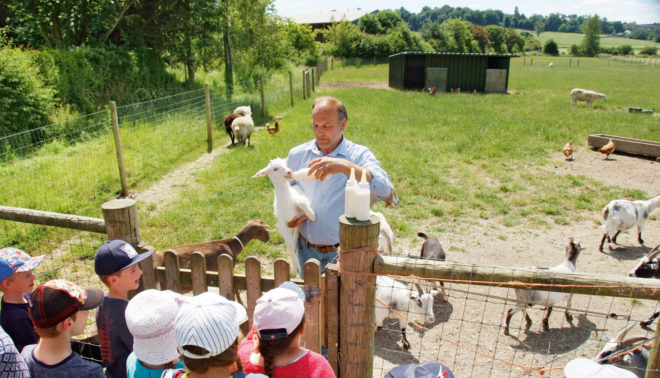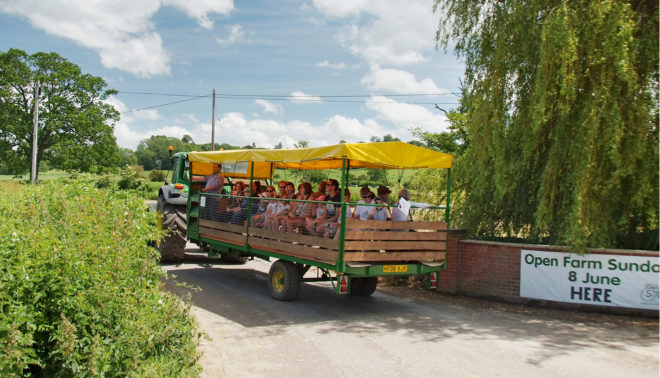“But I don’t want to go home,” the little girl wails, as her parents cajole her into the car. Together, they have enjoyed an afternoon of fresh air, sunshine, freedom to do things and access places that are normally not open to them. The little girl has tumbled off bales into soft straw, clambered into the cabs of combines and tractors, ‘milked’ an artificial cow, and handled baby chicks, lambs and goats. With her friends, she has picnicked, laughed and played in the countryside. It is Open Farm Sunday, a June day when some 365 farms from Jersey to Shetland open their gates to the general public and say, “Welcome! Come in!”
For one, brief day, children enjoy the heritage that in earlier days was the birthright of many, if not most, children. Today, however, it’s estimated that more than a third of all children have never even heard a real cow moo, and a fifth of the population has never visited a farm. The consequence of modern agricultural practice and today’s more enlightened understanding of what constitutes a duty of care means that total freedom for children is no longer realistic.

Wiltshire farmer John Butler encourages young people.
Fortunately, agriculture and rural industry is well endowed with people who have a passion to pass on the next generation their own love for rural culture, farming and nature. They recognize the risk that, generation by generation, children can easily become isolated from the realities of life and deprived of precious experiences that previous generations took for granted.
Encouragement and respect
Wiltshire farmer John Butler is one of many farmers who have helped to make it possible for all schoolchildren to visit a real farm. “I think it’s very important to encourage young people and help them with their education,” he declared.
As he talks, he may not use the word ‘respect’, but it’s clear that’s what he feels for the 1000 or more children who come to Rowdefield Farm each year on organized school visits. Many farmers, Mr Butler among them, only began to open their farms to educational visits as one of the aspects of the Countryside Stewardship Scheme. This resulted in a network of farmers who have the experience and the facilities to fulfill what can now be seen as a real educational need. “Children’s aspirations are higher than they were,” Mr Butler commented. “They are increasingly interested in other aspects of agriculture. But the trick is not to get too technical.”
Initially, school visits were based in the farm workshop, but the first purpose-built ‘schoolroom’ was opened at Rowdefield in 2007, with space to accommodate a full class of primary children. Since then, school class sizes have increased and the curriculum has diversified, so there are plans to convert an old cowshed into a larger, general purpose teaching facility. Mr Butler would like to make better use of electronic media and to explore developing agricultural technologies, such as robotics and precision farming.
He emphasizes the importance of knowing a little about the children themselves, so that he can establish points of interest. With primary school children, animals are an easy focus. The technicalities of arable cropping are not quite as inviting, but introducing practical activities such as grinding wheat to make flour help to emphasize aspects of the food chain. “Teachers also tend to be less aware of the arable side,” he commented.
It’s important to encourage young people and help them with their education.
John Butler
Not least of the experiences enjoyed by earlier generations of children was the opportunity to work alongside adults as part of a team. But as paid farm workers have declined in number, increasingly the adults they work with are Dad and Mum, and the children who get to experience a farm are those lucky enough to have been raised there.
Country children once learned through contact with experienced workmen and women; but those days have long gone, replaced by brief, controlled visits in a more formal teaching context. Even so, they clearly have a big influence on children.
Memorable experiences

Carol Snowden has her own teaching methods.
“First-hand experiences make a big impression and are more memorable than other teaching methods,” said Carol Snowden, Year Three Class Teacher at Frogwell Primary School, Chippenham, Wiltshire. In a single sentence she sums up the reasons why school visits to farms have become so popular in recent years. It would be difficult to think of a manageable environment that could offer more eye- ear- and nose-opening experiences than a real, working farm in unspoiled countryside.
While urban adults might flinch at mud, manure and animal smells, for children who are meeting them for the first time, they are memories in the making. “Children want to be dirty, and like the smells and other farm surprises, because they use all their senses,” Mrs Snowden said. “That gives them memories.”
These memories can then be recalled and applied again and again in subsequent education and in later life, she explains. For seven- and eight-year-olds at Frogwell Primary, their farm visit is wrapped up in a three-day stay at a centre just a mile’s walk from the host farm.
What the children do at the farm is always carefully linked with the teaching curriculum. Subjects such as food chains, care of the environment and nutrition are part and parcel of the primary school learning agenda, together with reading, mathematics and other academic skills.
Children want to be dirty, and like the smells and other farm surprises, because they use all their senses.
Carol Snowden
Even in this predominantly rural area, only a very small proportion of children end up working in agriculture. But who knows what seeds of ambition may be sown in the fertile minds of young children? “For all children it gives an example of a career opportunity.” It’s an eye-opener to them to discover that there are many possible ways of becoming part of a great industry, even if farming doesn’t run in the family.
Interlocking relationship

Teacher Yousaf Mirza thinks, that young people are linked to the landscape.
“What’s crucial is how seven- to ten year-olds understand where their food comes from. This has an impact on the landscape, their well-being, and the livelihoods of everybody responsible for getting food from farm to plate.” Yousaf Mirza gets it. He first spotted this interlocking relationship as a child growing up in rural Leicestershire. His interest developed further while teaching geography in secondary schools, and organizing trips and expeditions that aimed to open the eyes of young people to the consequences of ordinary decisions upon the world around them.
He believes young people are intrinsically linked to the landscape. “Food, clothing, fuel and water are just some of the examples of things we rely on the managed landscape to provide,” he said. “Many people are unaware of the significance of this connection, due to changes in employment numbers in the primary industry sector.” He considers that, if not transferred to young people, a gradual loss of skills will lead to a change in how future generations could choose to use their landscapes.
Now head of education at Braeside Education and Conference Centre in Wiltshire, Mr Mirza uses the resources of the area as a practical ‘classroom’, taking in places such as Rowdefield Farm. Braeside provides accommodation and facilities for schools to broaden children’s understanding of the world and themselves plus opportunities to practice life skills. For example, children may be sent out to buy the ingredients for their own lunches on market day. Their choices are then discussed and evaluated.
What’s crucial is how seven to ten year-olds understand where their food comes from.
Yousaf Mirza
“Whatever food is on your plate comes from somewhere, and somebody,” he explained. “This influences jobs, finances, the environment and landscape. We also explain the ‘before’ and ‘after’ consequences of simple choices such as whether to choose organic, Fair Trade or local products.” By these means he hopes that, as adults, the children will take more responsibility for stewardship of the environment, the character of the landscape and encouraging the agricultural economy to move forward.
Mission to pass skills on

Andrew Williams passes on the old crafts.
Forestry-trained Andrew Williams is quietly spoken, almost shy, but he admits he’s a man gripped by a love of country skills, and his interest becomes a passion when he talks about handing these skills on to the rising generation. “The old crafts were still alive when I started out,” he says. “I think it’s so important in my own time to pass them on.” Some hedges are 1000 years old, so they have been features of the land for all that time. “If all hedges were left untended, it would destroy the landscape,” he believes. But even today, hedge laying is more than just a way of improving the view.
The Royal Agricultural University at Cirencester, Gloucestershire, considers it an important part of boundary maintenance and conservation and runs week-long hedge laying courses for agricultural students and others who need to acquire the necessary skills. Mr Williams is an instructor on these courses during the winter hedge laying season and also targets local schools. He devised a way of setting up a mini-hedge laying competition that can be done in the classroom, using natural materials. He estimates that he introduces at least 100 people a year to this traditional craft. “My real passion is for passing it on,” he says, remembering a wide-eyed farm apprentice who said to him, “I didn’t know jobs like this ever existed.”
This article was first published in The Furrow magazine in June 2015.




